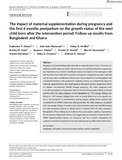| dc.contributor.author | Adams, Katherine P. | |
| dc.contributor.author | Adu-Afarwuah, Seth | |
| dc.contributor.author | Mridha, Malay K. | |
| dc.contributor.author | Oaks, Brietta M. | |
| dc.contributor.author | Matias, Susana L. | |
| dc.contributor.author | Arnold, Charles D. | |
| dc.contributor.author | Kumordzie, Sika M. | |
| dc.contributor.author | Okronipa, Harriet | |
| dc.contributor.author | Ocansey, Maku E. | |
| dc.contributor.author | Dewey, Kathryn G. | |
| dc.date.accessioned | 2022-04-21T04:17:21Z | |
| dc.date.available | 2022-04-21T04:17:21Z | |
| dc.date.copyright | 2020 | |
| dc.date.issued | 2020-04 | |
| dc.identifier.citation | Adams, K. P., Adu-Afarwuah, S., Mridha, M. K., Oaks, B. M., Matias, S. L., Arnold, C. D., Kumordzie, S. M., Okronipa, H., Ocansey, M. E., & Dewey, K. G. (2020). The impact of maternal supplementation during pregnancy and the first 6 months postpartum on the growth status of the next child born after the intervention period: Follow-up results from Bangladesh and Ghana. Maternal & child nutrition, 16(2), e12927. https://doi.org/10.1111/mcn.12927 | en_US |
| dc.identifier.uri | http://hdl.handle.net/10361/16554 | |
| dc.description | This article was published in Maternal & Child Nutrition [ © 2020 The Authors. Maternal & Child Nutrition published by John Wiley & Sons, Ltd.] and the definite version is available at: https://doi.org/10.1111/mcn.12927 The Journal's website is at: https://onlinelibrary.wiley.com/doi/10.1111/mcn.12927 | en_US |
| dc.description.abstract | Pregnancy and breastfeeding make demands on maternal nutrient stores. The extent of
depletion and the degree to which nutrient stores are replenished between pregnancies
has implications for a mother's nutritional status at conception of the subsequent child
and therefore that child's birth outcomes and growth. Using follow-up data collected
several years after a randomized effectiveness trial conducted in rural Bangladesh and
a randomized efficacy trial conducted in semiurban Ghana, we evaluated the impact of
maternal supplementation with small-quantity lipid-based nutrient supplements (LNS)
or multiple micronutrients (MMN) through pregnancy (the index pregnancy) and
6 months postpartum on the growth status of the next living younger sibling conceived
and born after the index pregnancy. In both Bangladesh (n = 472 younger siblings) and
Ghana (n = 327 younger siblings), there were no overall differences in the growth sta tus or the prevalence of undernutrition among younger siblings whose mothers had
received LNS (or MMN, Ghana only) during and after the index pregnancy compared
with the younger siblings of mothers who had received iron plus folic acid (IFA) during
the index pregnancy (Ghana) or during and for 3 months after the index pregnancy
(Bangladesh). These findings do not indicate that preconception nutrition interventions
do not improve child growth. Rather, they suggest that any benefits of maternal LNS or
MMN supplementation during one pregnancy and for 6 months postpartum are
unlikely to extend to the growth of her next child beyond any effects due to IFA alone. | en_US |
| dc.language.iso | en_US | en_US |
| dc.publisher | Wiley | en_US |
| dc.relation.uri | https://onlinelibrary.wiley.com/doi/10.1111/mcn.12927 | |
| dc.subject | Bangladesh | en_US |
| dc.subject | Child growth | en_US |
| dc.subject | Ghana | en_US |
| dc.subject | Preconception nutrition | en_US |
| dc.title | The impact of maternal supplementation during pregnancy and the first 6 months postpartum on the growth status of the next child born after the intervention period: Follow-up results from Bangladesh and Ghana | en_US |
| dc.type | Journal Article | en_US |
| dc.description.version | Published | |
| dc.contributor.department | Brac James P. Grant School of Public Health | |
| dc.identifier.doi | https://doi.org/10.1111/mcn.12927 | |
| dc.relation.journal | Maternal & Child Nutrition | |

